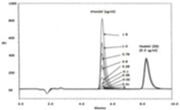Abstract
Atenolol is a beta-blocker that is cardioselective, meaning it only affects beta receptors. It is used to treat angina pectoris and high blood pressure. The HPLC and Capillary Zone Electrophoresis analytical technique was developed for the purpose of detecting and quantifying Atenolol in human plasma, according to the study paper you're reading right now. The internal standard and atenolol were recovered from the solution after being extracted from plasma using the Liquid-Liquid Extraction method. A mobile phase of 10mM sodium hydrogen phosphate, 7.3mM Sodium Lauryl sulphate (pH=3), methanol, and acetonitrile (40:57:3, v:v:v) is used, with a flow rate of 1.0ml/min. A fluorescence detector was used to detect the isolated materials, which had an excitation wavelength of 229 nm and an emission wavelength of 298 nm. With this in view, Atenolol's and the internal norm's survival times are observed to be 5.4 and 8.3 minutes, respectively. The linear correlation coefficient (R20.9992) was found in the Atenolol calibration curve. The recovery rate for atenolol and an internal norm was estimated to be between 76 and 87 percent. Solid-phase extraction was performed on an uncoated silica capillary with a diameter of 58.5 cm 75 m, and detection was performed at 194 nm in the Capillary Zone Electrophoresis procedure. For an electrolyte solution containing 50mM H3BO3 and 50mM Na2B4O7 (50:50 V/V), atenolol was determined to be present in the solution in less than 3 minutes. Energized with a voltage of 25kV and injected with a hydrodynamic configuration for 4S. Under various conditions, this method was used to assess the stability and capability of measuring Atenolol in human plasma.
Full text article
References
Amendola, L., Molaioni, F., Botrè, F. 2000. Detection of beta-blockers in human urine by GC-MS-MS-EI: perspectives for the antidoping control. Journal of Pharmaceutical and Biomedical Analysis, 23(1):211–221.
Arias, R., Rosa, M., Jimenez 2001. Determination of the beta-blocker atenolol in plasma by capillary zone electrophoresis. 916(1-2):297–304.
Atenolol Monograph for Professionals 2018. Atenolol. Drugs.com. AHFS. Retrieved 23 December 2018.
Braza, A.J., Modamio, P., Mariño, E. L. 2000. Two reproducible and sensitive liquid chromatographic methods to quantify atenolol and propranolol in human plasma and determination of their associated analytical error functions. Journal of Chromatography B: Biomedical Sciences and Applications, 738(2):225–231.
Chatterjee, D.J., Li, W.Y., Hurst, A.K., Koda, R.T. 1995. High-Performance Liquid Chromatographic Method for Determination of Atenolol from Human Plasma and Urine: Simultaneous Fluorescence and Ultraviolet Detection. Journal of Liquid Chromatography, 18(4):791–806.
Chiu, F.C.K., Zhang, J.N., Li, R.C., Raymond, K. 1997. Efficient assay for the determination of atenolol in human plasma and urine by high-performance liquid chromatography with fluorescence detection. Journal of Chromatography B: Biomedical Sciences and Applications, 691(2):473–477.
Dale, A.D., Turner, S.E. 1990. The analysis of atenolol in plasma using an automated sample preparation technique. Journal of Pharmaceutical and Biomedical Analysis, 8(8-12):1055–1058.
De Abreu, L., De Castro, S., Pedrazzolijjr 2003. Atenolol Quantification in Human Plasma by High- Performance Liquid Chromatography: Application to Bioequivalence Study. AAPS Pharm Sci, 5(2):116–112.
FDA 2018. Bioanalytical Method Validation Guidance for Industry, Food and Drug Administration, Centre for Drug Evaluation and Research (CDER). 01 May 2018.
Gonzalez, O., Iriarte, G., Rico, E., Ferreirós, N., Maguregui, M.I., Alonso, R.M., Jiménez, R.M. 2010. LC–MS/MS method for the determination of several drugs used in combined cardiovascular therapy in human plasma. Journal of Chromatography B, 878(28):2685–2692.
Gwak, H.-S., Chun, I.-K. 2007. Bioequivalence Evaluation of Two Atenolol Tablet Preparations in Korean Healthy Male Volunteers. The Journal of Applied Pharmacology, 15(3):187–191.
Hebert, M.F., Carr, D.B., Anderson, G.D., Blough, D., Green, G.E., Brateng, D.A., Kantor, E., Benedetti, T.J., Easterling, T.R. 2005. Pharmacokinetics and Pharmacodynamics of Atenolol During Pregnancy and Postpartum. The Journal of Clinical Pharmacology, 45(1):25–33.
Heel, R.C., Brogden, R.N., Speight, T.M., Avery, G.S. 1979. Atenolol: A Review of its Pharmacological Properties and Therapeutic Efficacy in Angina Pectoris and Hypertension. Drugs, 17(6):425–460.
Li, S., Liu, G., Jia, J., Liu, Y., Pan, C., Yu, C. 2007. Simultaneous determination of ten antiarrhythmic drugs and a metabolite in human plasma by liquid chromatography-tandem mass spectrometry. Journal of Chromatography B, 847(2):174– 181.
Meissner, G., Hartonen, K., Riekkola, M.L. 1998. Supercritical fluid extraction combined with solid phase extraction as sample preparation technique for the analysis of β-blockers in serum and urine. Fresenius’ Journal of Analytical Chemistry, 360(5):618–621.
Miller, R.B. 1991. A validated high-performance liquid chromatographic method for the determination of atenolol in whole blood. Journal of Pharmaceutical and Biomedical Analysis, 9(10-12):849– 853.
Minamide, Y., Osawa, Y., Nishida, H., Igarashi, H., Kudoh, S. 2011. A highly sensitive LC-MS/MS method capable of simultaneously quantitating celiprolol and atenolol in human plasma for a cassette col microdosing study. Journal of Separation Science, 34(13):1590–1598.
Morris, R.G., Saccoia, N.C., Sallustio, B.C., Zacest, R. 1991. Improved High-Performance Liquid Chromatography Assay for Atenolol in Plasma and Urine Using Fluorescence Detection. Therapeutic Drug Monitoring, 13(4):345–349.
Spanakis, M., Niopas, I. 2013. Determination of Atenolol in Human Plasma by HPLC with Fluorescence Detection: Validation and Application in a Pharmacokinetic Study. Journal of Chromatographic Science, 51(2):128–132.
Wander, G.S., Chhabra, S.T., Kaur, K. 2009. Atenolol Drug Profile. Journal of the Association of Physicians of India, 57:13–16.
Yilmaz, B., Arslan, S. 2009. GC–MS Determination of Atenolol Plasma Concentration after Derivatization with N-methyl-N- (trimethylsilyl) trifluoroacetamide. Chromatographia, 70(9-10):1399–1404.
Yusuf, A., Syed, N., Alvi 2016. Development and validation of RP-HPLC method for the determination of atenolol in human plasma. World Journal of Pharmacy and Pharmaceutical Sciences, 5(2):169– 179.
Authors

This work is licensed under a Creative Commons Attribution-NonCommercial-NoDerivatives 4.0 International License.

